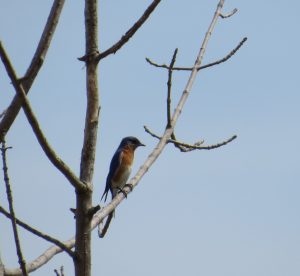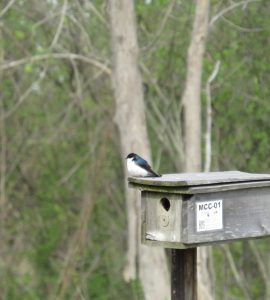
What is birding?
Birding is a lot of things. It is a great way to get outdoors, get some exercise, and make friends; it can help you connect with nature, it can give you a wider understanding of your local ecosystem, and can give you a deeper appreciation for the non-human world. Birding can be done anywhere and by anyone, and is enjoyed by people with a wide variety of skill levels.
How do I start birding?
Whenever you are trying out something new, the first step can be intimidating. However, there are a lot of great ways to get into birding. You can start by paying attention to the birds you see and hear in your day-to-day activity, and take notice of the ones that stand out to you most. If you already know the names of some bird species, try doing some research into them. You may learn something new!

If you want to develop your bird identification skills, field guides (whether traditional or digital) are a great way to do this. There are lots of options available, for a wide variety of experience levels and budgets. Taking your field guide out into the field and starting to teach yourself new species can be an incredibly rewarding experience! Digital field guides such as the Merlin app can also be incredibly useful. Merlin also includes a vast library of bird recordings as well as a machine learning system for identifying bird song, which can be a great introduction to learning to identify bird songs and calls.
One of the best ways to expand your birding skills is learning from people with lots of birding experience. Getting involved in your local birding community is a great way to do this. Local organizations will often run hikes led by birding experts, which can be a great opportunity to learn birding tips and tricks and ask any questions you might have. Organizations like the Bird Study Group in Hamilton also host meetings and events, which are a great opportunity to learn and meet others in the hobby.
What equipment do I need?
Birding does not necessarily require any special equipment, but there are some common tools people like to use. Binoculars are commonly used to get a close look at distant birds, whether songbirds hiding up in trees or ducks out on the lake. High-quality binoculars can be quite expensive, but there are a variety of options to choose from depending on your preference.
For many people, keeping track of the birds they see is an important part of birding. Some people keep handwritten field journals or draw new species whenever they see them, while others use apps to record their sightings. A great app for recording bird sightings is eBird. It allows you to submit checklists of your birding outings, and keeps track of when, where, and how many birds you saw. eBird also shows birding hotspots, which can help you plan future birding trips. The hotspot feature is invaluable if you are unfamiliar with the best birding sites in your area. iNaturalist is another app that works similarly to eBird, but it allows you to post observations of any organism (rather than exclusively birds). However, iNaturalist generally requires a photo or audio recording to be included with an observation, which can be difficult to get without expensive cameras or microphones.
If this inspires you to get into birding, let us know by tagging us at @naturemcmaster on Instagram!
